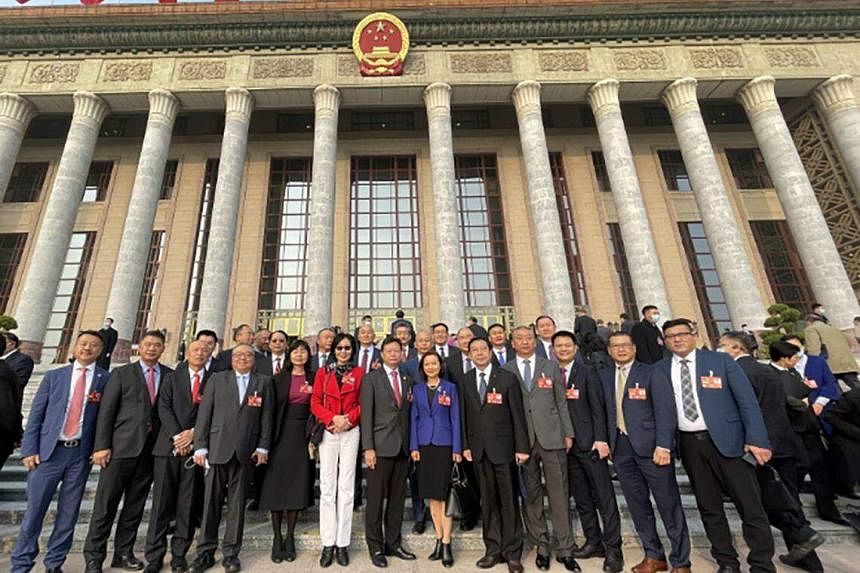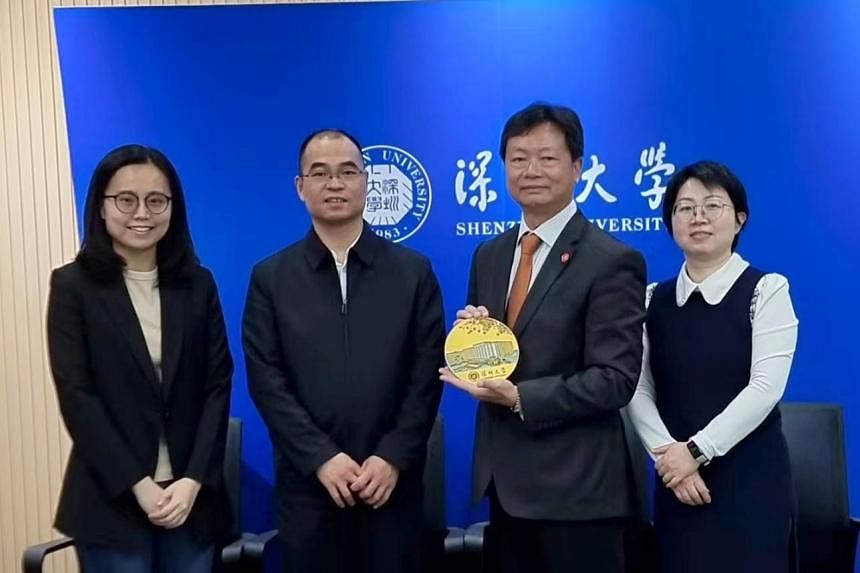BEIJING - As China sees an increasingly hostile alliance of countries bent on containing it, the East Asian giant appears to have intensified its outreach to overseas Chinese to help promote its narrative, influence policies and advance its power.
Three years of Covid-19 isolation had in part crimped its ability to carry out such work, but efforts resumed apace as it emerged from its tough pandemic measures in early 2023.
Singapore delegations were invited to visit China at the beginning of last year, even before visa applications resumed, as The Straits Times had reported.
In March 2023, it invited a naturalised Singaporean businessman active in the local grassroots community to attend annual meetings of its top political advisory body during its parliamentary session.
It was here, in Beijing, that Mr Philip Chan Man Ping, 59, a Hong Kong-born real estate investor, implored ethnic Chinese around the world to band together to “tell the China story well”.
The Singapore authorities have now signalled that they intend to use a new anti-foreign interference law against Mr Chan by designating him a “politically significant person” because his activities were “directed towards a political end in Singapore”. They did not, however, link him to any particular country.
But his public comments and activities suggest that he is using his influence and network to propagate favourable views toward China that have veered into the political realm.
According to the International Organisation for Migration, a United Nations agency, there are an estimated 60 million people of Chinese origin overseas. As China seeks to expand its global influence and secure its interests amid increasing pushback from the United States and other countries, co-opting the Chinese diaspora has gained urgency.
In recent years, its diplomats, state media and citizens have been encouraged to “tell the China story well” as Beijing wrestles for control over discourse it said is dominated by western liberal nations.
Its flagging economy has also added pressure to the need for greater foreign investment.
A patriotic education law passed in Oct 2023 requires the state to strengthen communication with overseas Chinese, “enhancing overseas Chinese feelings of patriotism and carrying forward the patriotic tradition”.
Since 2018, the Overseas Chinese Affairs Office under the Chinese government has also been integrated into the United Front Work Department under the Communist Party of China, according it greater strategic importance.
Veteran diplomat Ong Keng Yong, who is also executive deputy chairman of the S. Rajaratnam School of International Studies, said the ease of doing business and operating among foreign corporations and organisations via Singapore, has emboldened Chinese companies and entities to use Singapore to reach out to others in the region and beyond.
“From this perspective, efforts have been made to cultivate relevant opinion makers and policy people. The idea is to have a PRC-friendly constituency,” said Mr Ong, using the acronym for the People’s Republic of China. Mr Ong is Ambassador-at-Large at Singapore’s Ministry of Foreign Affairs.
“In this endeavour, the pool of Chinese expatriates or naturalised Singapore citizens of Chinese origin is important. Initially, cultivation efforts revolved around business and some ancestry ties. This has now become more obvious and those inside this circle have become bolder and outgoing,” he said, adding that Mr Chan is one such individual.

The Foreign Interference (Countermeasures) Act (Fica), which is now used against Mr Chan, was passed in 2021 to thwart any foreign actor from manipulating domestic politics.
Provisions under this law to counteract foreign interference via local proxies, covering politically significant persons, came into force only on Dec 29, 2023. Other provisions to counter hostile information campaigns took effect on July 7, 2022.
Assistant Professor Dylan Loh, who researches Chinese foreign policy at the Nanyang Technological University, said the timing of Mr Chan’s case could be attributed to how Fica has now provided the tools for the Government to act in this calibrated way.
“I do think that the attempt to intensify United Front efforts has increased,” said Prof Loh, citing the merger of the Overseas Chinese Affairs Office, tasked with cultivating ethnic Chinese abroad, with the United Front Work Department, which directs all engagement and influence activities in China and elsewhere.
Bringing the Chinese diaspora into the fold has been a clarion call by President Xi Jinping since he took power in 2012.
At the 20th party congress in 2022, where he gained a historic third term as the Communist Party’s leader, he told cadres that China will “improve and strengthen our work related to Chinese nationals overseas to give shape to a powerful joint force for advancing the rejuvenation of the Chinese nation”.
A former senior Singapore diplomat said pro-China and anti-America sentiments among Singaporean Chinese, especially those aged 70 and over, have become more pronounced, “especially since President Xi’s appeal to all ethnic Chinese including those overseas to love and be loyal to China”.
These have included even former Members of Parliament, said the retired envoy, who asked not to be named because of political sensitivities.
“Non-Chinese racial groups in Singapore have begun to react to this brazen display of Chinese chauvinism, albeit mostly private resentment thus far. This will grow out of hand if not contained. Imagine how our Chinese and Indians would react if there is an outbreak of hostilities between China and India?”
Chinese influence in Singapore has been a longstanding issue, with the Republic being the only country outside of mainland China, Hong Kong, Macau and Taiwan with a majority ethnic Chinese population. Many social institutions from clan associations to some business advocacy groups have maintained ties with their mainland counterparts.
As news about Mr Chan made the headlines on Friday evening, Singapore observers pointed to his participation at last year’s session of top advisory body Chinese People’s Political Consultative Conference, or CPPCC, as one of the key reasons he had caught the attention of the authorities.
Analysts have different views of what it means to be invited to attend these parliamentary meetings, where delegates representing a cross-section of society submit proposals and give suggestions.
Some say that the Communist Party uses these observers’ attendance to suggest that its policies have their support. Past participants have pointed to networking opportunities with international and Chinese elites.
The CPPCC, while not a policymaking organ, remains a key United Front platform to engage prominent individuals outside of the CPC to solicit their feedback on various issues related to China.
Past and present members, who now number 2,200, have included basketball star Yao Ming and action movie star Jackie Chan. Property tycoon Robert Ng, who runs the Hong Kong arm of Singapore’s Far East Organisation, is also a CPPCC delegate.
Since 2001, the CPPCC has invited foreign citizens of Chinese origin from around the world to attend as observers, or non-voting delegates. As they are not members of the CPPCC, they cannot file proposals, but are invited to make suggestions.
They are usually prominent businessmen, academics and leaders of business, social and cultural groups, including youth associations and chambers of commerce. As a rule, each representative is invited to attend in person only once in their lifetime.
Home Affairs and Law Minister K. Shanmugam, in his wrap-up speech on the Fica Bill in Parliament in October 2021, assured Members of Parliament that the law is not meant to curb freedom of speech and foreign interactions.
“Fica will not stop individuals, businesses and organisations in Singapore from building overseas partnerships, soliciting overseas business, networking with foreigners, sourcing for donations, discussing government policies or political matters that affect their businesses with foreign colleagues or business partners or supporting charities.
“As long as these are done in an open and transparent manner and not part of an attempt to manipulate our political discourse or undermine public interest such as security.”
It will also not cover Singaporeans expressing their own views, said Mr Shanmugam.
Political scientist Chong Ja Ian said that the “irregular, unconventional, and sometimes clandestine approach that the United Front takes toward lobbying and influencing politics in other jurisdictions allows Beijing to have plausible deniability”.
For instance, an Australian senator who defended China over the South China Sea was forced to resign in 2018 after it was discovered that he had accepted donations from a source with ties to the Chinese government.
Besides Australia, countries such as the United Kingdom, Canada, and the US have alleged United Front activities, noted Associate Professor Chong of the National University of Singapore.
“Sometimes Beijing will defend these activities as legitimate and claim that (the) authorities in these places are targeting persons from or related to the PRC. At other times, they keep silent.”
Despite the greater attention that has been drawn to the United Front and its work worldwide, the activities do not seem to have abated, said Prof Chong.
“I am doubtful that Singapore will be an exception.”
Noting that Mr Chan had held grassroots positions, including as a patron of Kampong Chai Chee Citizens’ Consultative Committee, Prof Chong said that “there should be more discussion of the grassroots activities Chan engaged in and his links with ministers, especially any lobbying activity”.
Referring to the People’s Action Party, he added: “The PAP is obviously the most influential political entity in Singapore. That makes it, more than anything else, the most likely target for any influence operation.”
The People’s Association said in a statement on Feb 2 that Mr Chan has stepped down from all grassroots appointments.
The Chinese Foreign Ministry did not respond to a request for comment by The Sunday Times on Feb 3.
This latest incident is unlikely to have an impact on bilateral relations, said Prof Loh. Singapore and China upgraded their ties in 2023, during Prime Minister Lee Hsien Loong’s April meeting with President Xi in Beijing.
Singapore cannot act on the basis of whether a policy or actions will offend another country, and needs to prioritise its own national security and interests, said Prof Loh.

